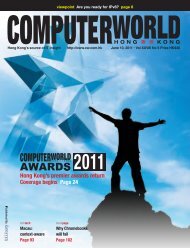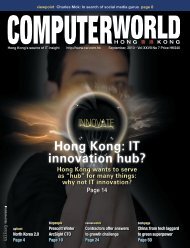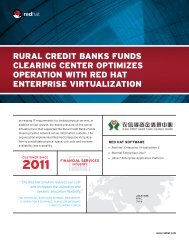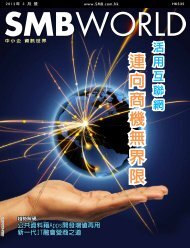Hong Kong Computer Society - enterpriseinnovation.net
Hong Kong Computer Society - enterpriseinnovation.net
Hong Kong Computer Society - enterpriseinnovation.net
You also want an ePaper? Increase the reach of your titles
YUMPU automatically turns print PDFs into web optimized ePapers that Google loves.
threat—according to researcher CNNIC,<br />
less than one percent of China’s population<br />
was online in 1999—and took a<br />
hands-off approach that the tightly controlled<br />
media sector envied. Government<br />
bureaucrats saw the Inter<strong>net</strong> more as a<br />
technological innovation.<br />
The government body most involved<br />
at that time was the Ministry of Information<br />
Industry (MII), which oversaw the<br />
development of the country’s telecoms<br />
infrastructure. MII saw the Inter<strong>net</strong> as<br />
another way of increasing China’s telecoms<br />
usage, and thus its own revenues.<br />
Imported skills, unfettered<br />
ambition<br />
With no state-owned enterprises as<br />
competitors, little direct government<br />
control, and relatively low barriers to<br />
entry, Chinese Inter<strong>net</strong> entrepreneurs<br />
flourished. They had access to Silicon<br />
Valley’s capital and know-how, as many<br />
of the entrepreneurs were returnees from<br />
overseas.<br />
People like Baidu’s Robin Li, Sohu’s<br />
Charles Zhang, and Ctrip’s James Liang<br />
had been valuable members of the<br />
American engineering community before<br />
they returned to China. It was a new,<br />
Darwinian world where only the fittest<br />
survived. The result was a burgeoning<br />
Chinese Inter<strong>net</strong> market with a bevy of<br />
competing services.<br />
The strongest players, with the most<br />
creative ideas and best overall performance,<br />
eventually dominated their<br />
individual sectors—Baidu for search<br />
engines, Taobao for online auction, Tencent<br />
for online chat, and Sina for online<br />
portals. In fact, today these companies<br />
are so strong that they have beaten their<br />
Western rivals—Google, eBay, Yahoo,<br />
and so on—in the battle for Chinese online<br />
consumer loyalty.<br />
China’s Inter<strong>net</strong> is no longer a niche<br />
market. Over 25 percent of the population<br />
is online, according to CNNIC, and<br />
the numbers are increasing faster than<br />
anywhere else in the world. This is a<br />
mixed blessing, as the Inter<strong>net</strong> has now<br />
“come to the attention of the authorities.”<br />
China’s government has recognized the<br />
Inter<strong>net</strong> as a powerful media force, and<br />
something to be controlled. Regulation<br />
is no longer solely the domain of the<br />
business and technology friendly MII,<br />
which recently changed its name to the<br />
Ministry of Industry and Information<br />
Technology (MIIT). New, hard-line regulators<br />
are entering the fray, including<br />
the State Administration of Radio, Film,<br />
and Television (SARFT). SARFT traditionally<br />
regulated China’s TV stations<br />
and cares more about policy and political<br />
agenda than promoting Inter<strong>net</strong> use.<br />
Video effect<br />
The change was most apparent in the<br />
licensing of video-sharing sites in 2008.<br />
SARFT initially required all videosharing<br />
sites to be government owned.<br />
Though strong protests from the industry<br />
forced it to cancel this strict requirement,<br />
a frustrating litany of requirements needed<br />
to be met before licenses were issued.<br />
SARFT even made an example of one of<br />
the major players, to show that it meant<br />
business. 56.com, the third most popular<br />
video-sharing site at the time, was suspended<br />
for a month in June 2008 before<br />
eventually getting its license. The effects<br />
were devastating—56.com lost its popularity<br />
and ceased to be a major player.<br />
Kou, however, does not think that the<br />
government’s role in the Inter<strong>net</strong> business<br />
has changed fundamentally. “As<br />
Inter<strong>net</strong> services develop and mature,<br />
the government can implement more<br />
detailed rules to regulate different Inter<strong>net</strong><br />
businesses,” he said. That’s what<br />
happened: for example, the government<br />
launched regulations for online news, for<br />
online publications, and in 2008 came<br />
SARFT’s new rules on video-sharing<br />
sites.”<br />
Rules and regs<br />
Kou believes more regulation will<br />
emerge in the next two to three years.<br />
“The Inter<strong>net</strong> is like a double-edged<br />
sword. There is no doubt its development<br />
will benefit society and the people.<br />
But, without proper control, it can also<br />
have a negative impact.”<br />
The current regulatory environment<br />
reflects China’s consternation over exactly<br />
how much control is healthy in<br />
an industry. Over-controlling it would<br />
kill the creativity that has generated so<br />
much wealth, employment, and innovation.<br />
Under-controlling it allows media<br />
and technology to be used in acts that<br />
are harmful to society and to the government.<br />
The challenge facing the government<br />
is how far it can balance its urge to<br />
control the Web, while keeping entrepreneurial<br />
spirits flourishing.<br />
“Ultimately, the government does not<br />
want to kill the Inter<strong>net</strong> industry,” said<br />
Kou. “We just try to rule out what is<br />
deemed improper.” 3<br />
Author bio<br />
Sherman So is a<br />
journalist and was<br />
previously the lead<br />
China technology reporter<br />
for the South<br />
China Morning Post.<br />
Her work allowed her<br />
to witness the rise of China’s Inter<strong>net</strong><br />
sector first-hand and to talk to many<br />
of the entrepreneurs and industry experts.<br />
She graduated at the University<br />
of <strong>Hong</strong> <strong>Kong</strong> before earning a MBA<br />
at <strong>Hong</strong> <strong>Kong</strong> University of Science<br />
and Technology.<br />
J Christopher Westland is a professor<br />
at the University of Illinois, with<br />
extensive professional experience as<br />
a information technology, innovation<br />
and financial consultant in the US,<br />
Europe, Latin America and Asia.<br />
www.cw.com.hk<br />
Nov 2009 <strong>Computer</strong>world <strong>Hong</strong> <strong>Kong</strong> 51














